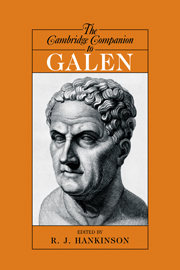Book contents
- Frontmatter
- 1 The man and his work
- 2 Galen and his contemporaries
- 3 Methodology
- 4 Logic
- 5 Language
- 6 Epistemology
- 7 Psychology
- 8 Philosophy of nature
- 9 Anatomy
- 10 Physiology
- 11 Therapeutics
- 12 Drugs and pharmacology
- 13 Commentary
- 14 The fortunes of Galen
- Appendix 1: A guide to the editions and abbreviations of the Galenic corpus
- Appendix 2: English titles and modern translations
- Bibliography
- Index
1 - The man and his work
Published online by Cambridge University Press: 28 September 2008
- Frontmatter
- 1 The man and his work
- 2 Galen and his contemporaries
- 3 Methodology
- 4 Logic
- 5 Language
- 6 Epistemology
- 7 Psychology
- 8 Philosophy of nature
- 9 Anatomy
- 10 Physiology
- 11 Therapeutics
- 12 Drugs and pharmacology
- 13 Commentary
- 14 The fortunes of Galen
- Appendix 1: A guide to the editions and abbreviations of the Galenic corpus
- Appendix 2: English titles and modern translations
- Bibliography
- Index
Summary
Galen was born in September AD 129, in Pergamum on the Ionian seaboard of Asia Minor. He died sometime in the second decade of the third century, probably in Rome. He lived, and worked, until well into his eighties; and over the course of that long and productive life wrote (or rather dictated, sometimes more than one treatise at a time, to relays of slaves) a vast number of works on a wide variety of topics, ranging from medicine, through logic and philosophy, to philology and literary criticism. Many - indeed most - of these books are lost; but we are fortunate to possess two short texts from Galen's own hand that deal with his output: On My Own Books (Lib.Prop.) XIX 8-48, = SM 2, 91-14, and The Order of My Own Books (Ord.Lib.Prop.) XIX 49-61, = SM 2, 80-90; the latter deals with the order in which an aspirant doctor should read them, while the former was written in order, he says, to help people determine which of the many works circulating under his name was genuine. These lists are not exhaustive: several indisputably genuine texts fail to appear in them, either because they were written later, or because for whatever reason Galen chose to disown them; moreover the Greek text suffers from several lacunae (although some of these have been filled from Arabic sources and by way of a newly recovered Greek manuscript in Véronique Boudon's recent edition).
- Type
- Chapter
- Information
- The Cambridge Companion to Galen , pp. 1 - 33Publisher: Cambridge University PressPrint publication year: 2008
- 28
- Cited by

